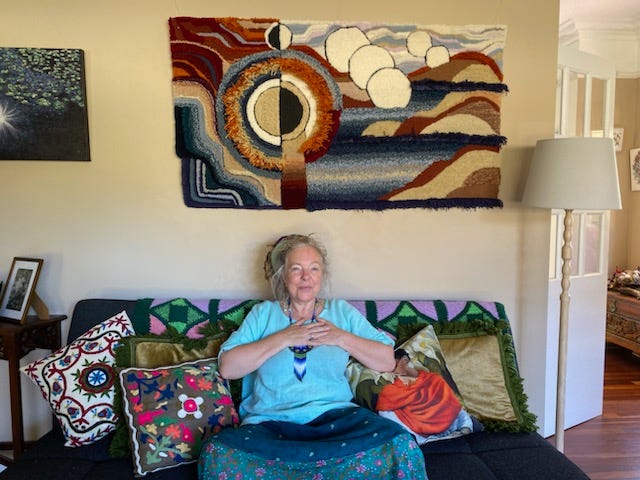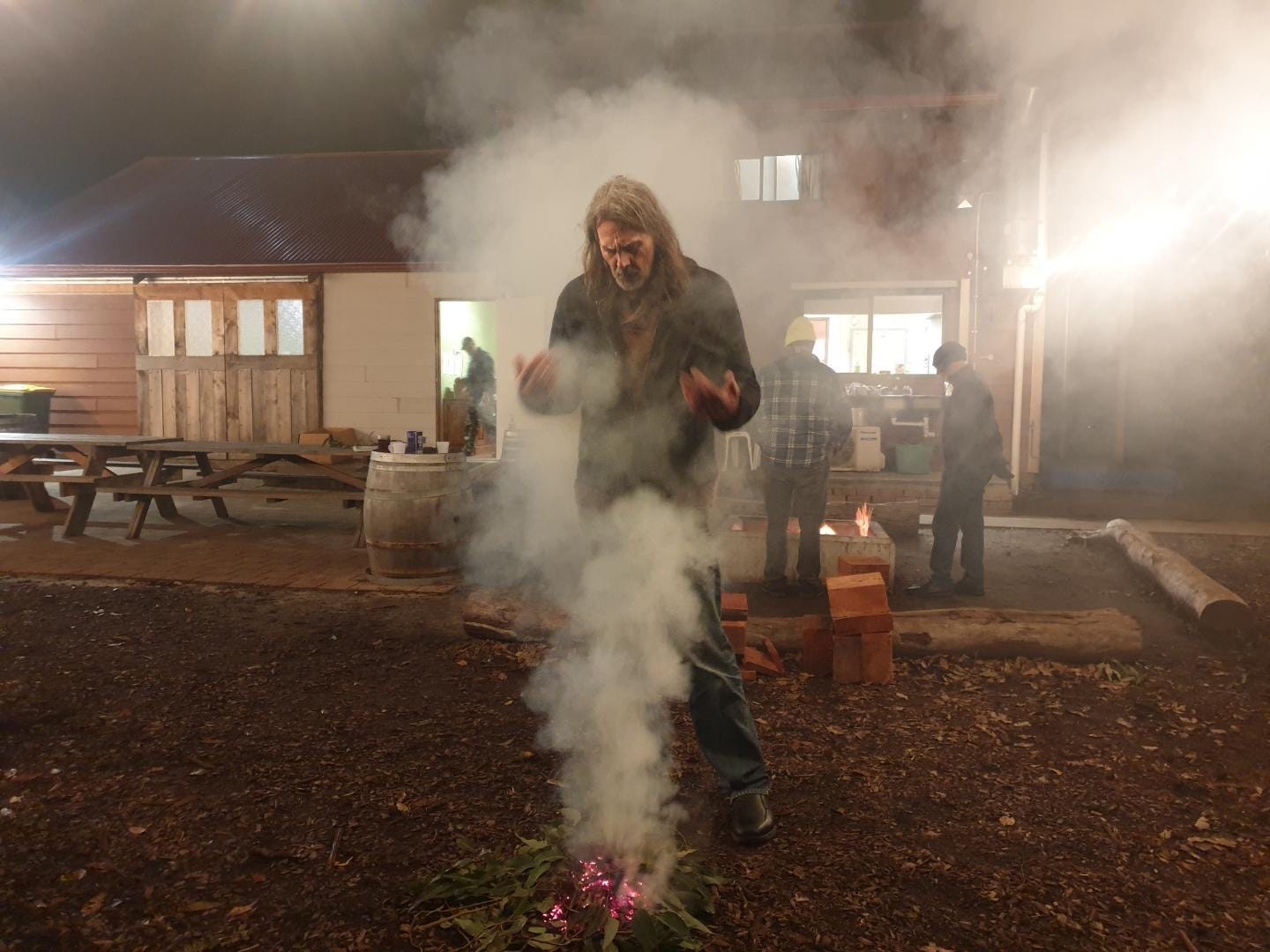Life lessons from a Deathwalker
Grief can be a dark and lonely road, but there are lights that can illuminate the path and keep you company along the way.
While not everyone is walking the road of loss at this exact moment, I think deep down we’re all grieving something (an imagined future, broken promise or dream job perhaps) or someone (maybe a pet, loved one or friendship). Here’s what I learned about life from looking for light in the darkest of places.
Love and fear, according to a Deathwalker
When I was writing my book, I interviewed a woman by the name of Zenith Virago. Zenith is a Deathwalker, accompanying people who are dying and those who love them through the process of death and - now - training others to do the same. As we sat in a Brunswick café, sipping coffee and waxing lyrical about life, death and everything between, she said something I’ve carried with me ever since.
‘When people are dying, one of two things tends to happen. Some people expand into love, and others contract into fear,’ she told me.
Admittedly, when people use language like ‘expand into love’ my brain tends to take a mini vacay. I have limited capacity for woo, preferring to use my average IQ for science over spirit. But having gone through the experience, I can’t tell you how true this turned out to be.
When Dad was angry, rude or distant – I could smell the fear on him. When he was going out of his way to be kind, generous or affectionate – he was pure love. It wasn’t one or the other, but either at any given moment on any given day.
Knowing that felt like a superpower, like I had X-ray vision that made his understandably unpredictable behaviour easier to navigate and harder to take personally.
It wasn’t just Dad, I felt the love and fear in me too. Perhaps – especially when we’re faced with big, icky challenges – we could all do with expanding a little more and noticing when we’re contracting (and reacting) out of fear.
Last night a Doula saved my life
You might’ve heard of Doulas in the context of birth; a cheerleader and support person who helps and advocates for parents (particularly mothers) through pregnancy, birth and the postnatal period. As I learned, death is not unlike birth - there’s a logic the body follows. And just like birth, there is an enormous amount of admin that goes into transitioning someone out of the world of the living and into whatever comes next. Understanding these processes and being able to communicate their nuances to someone navigating them for the first time is where an End-Of-Life Doula shines, and ours brought more value to my experience than I could ever put into words.
Due to my woo intolerance, I wasn’t sure I’d gel with Sohalia – all dreadlocks, essential oil and quiet, Buddha-like knowingness. But with 25 years’ palliative care experience under her belt, she expertly fielded my million clinical questions AND opened my eyes, mind and heart to the spiritual side of care. We engaged her to guide Dad through losing his life, but when he couldn’t go there emotionally (hello, fear) she turned her attention to saving mine. When I needed time off from Dad to mother or work, she was my respite. When I was lost, she helped orient me in the maze of our health, death and aged care systems. And when I fell apart, she gently put me back together and assured me I could keep going.
Advocating for someone who is dying gets harder as disease takes over; they become less sure of what they want and less able to communicate those wants. As a result, sometimes you feel like you are advocating against them – balancing wish with need.
In short, sometimes your suggestions and decisions can piss them off. Having someone to debrief, decompress and dismantle the hard days with is beyond helpful – it’s imperative.
While they can’t use them in their capacity as a Doula, if you can find one with clinical skills like nursing it makes them an invaluable sounding board and resource to translate medical advice if you don’t speak fluent medicine. Birth and death are the biggest transitions we will ever go through, and having someone to guide you who knows the landscape is like hiring a captain to drive a boat – smart, helpful and kind of essential to your survival.

Celebration and ceremony
One of the silver linings of having time to prepare for someone’s death is that, if they’re willing, you can get a sense of what they’d like at the end of their lives. Do they want to die in a hospice or at home? Do they want people around or to be alone? Burial or cremation? Funeral or party? We had the luxury of time to plan what Dad wanted and even share in the planning with the big fella himself.
My limited experience has taught me that you want any end-of-life event to be a reflection of everything that came before. I couldn’t imagine Dad going to a funeral, let alone having one. So, we threw him what he called ‘The After Party’ - a celebration of life at the local bowls club where people could gather and share. At Dad’s request, we laid out all of his belongings and let people ‘take home a piece of Jack’. It warms my heart knowing his things are living new lives in the homes of people who loved him, rather than being tossed into a donation bin.
There was no service, just a video I’d put together for Dad to watch before he passed and shared on the day at his request. My hope was it would show him that, while the incremental chapters of our lives can feel inconsequential, the sum of his added up to a life really well lived – where he was loved deeply, loved others fiercely and managed to achieve some good things for the world. Check it out below if you’d like to get to know Dad a little better.
I lost count of the number of people who came up to me at ‘The After Party’ and said they’d never thought about what they wanted at the end of their lives, but seeing it done differently had inspired them as to what’s possible. I’ll take that as a job well done, and one Dad would’ve been proud of.
Here’s what I know - death is a great teacher. Being brave enough to explore and embrace it enhances the quality and depth of our living.
Before we said goodbye, Zenith told me about a poem by Rumi called Dissolver of Sugar and suggested we can apply its sentiment to all suffering in our lives.
‘It’s like dissolving one of those sugar cubes in a cup of black tea; you drop it in and it dissolves so you can’t see the sugar cube, but it’s in there and it makes the tea sweeter,’ she says. ‘I think that in difficult situations, if you can learn to dissolve them within yourself, you’re sweeter for that experience, humbler and more grateful.’
I’m still early in the grief journey, but I think Rumi was probably right.
Extra resources:
For more information on deathwalker training, check out Zenith’s virtual and in-person courses here.
Ours came recommended, but on a quick Google Search I found an online Doula directory that breaks down by location and includes profiles, which could be a good place to start if you’re looking. Find it here. If you’re in Perth, reach out and I’ll share Sohalia’s details, who I can’t recommend highly enough.
Next Of Kin is written by health journalist Casey Beros to create a space where we can all become better Next Of Kin for each other and the world at large. If you know someone who would benefit from my musings, do me (and them) a huge favour and send this on. You can follow me on Instagram here and find out more about my work here.



